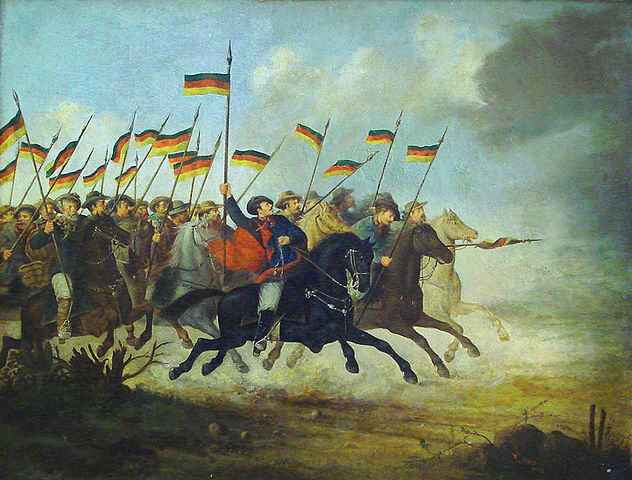*Image Credit: Wikimedia Commons Deep in southern Brazil, the city of Porto Alegre sits on the Atlantic Ocean. During the first few decades of the 19th century, it rapidly transformed into one of the primary commercial centers in the massive South American nation. Fed up with trading practices they believed favored merchants from nearby Uruguay and Argentina, farmers from the state of Rio Grande do Sul rebelled against the high taxes on their goods by launching an attack on the commercial center. On September 20, 1835, revolutionary forces captured Porto Alegre, launching the War of the Ragamuffins — a bloody and, ultimately, failed attempt to gain independence from the Brazilian Empire. Rio Grande do Sul is the furthest south of all the Brazilian states and, during the 1800s, its economy relied upon the production of charque, dried beef made from the cattle raised on the grassy plains of the Pampas shared with northeastern Argentina and northern Uruguay. Competing with imports from the neighboring countries, gauchos (residents of Rio Grande do Sul) faced heavy internal taxes levied by the Brazilian government under Dom Pedro I. Reliant upon charque and unable to secure as much business from other forms of agriculture, Rio Grande do Sul ended up losing out on the explosion of wealth throughout the rest of Brazil. By 1835, the anger had come to the forefront. Antonio Rodrigues Fernandes Braga, appointed by the crown to the office of president for the state, looked upon the restless people of Rio Grande do Sul as separatists, earning no favors as he denounced their supposed intentions. Quiet anger soon bubbled up into an uncontrollable fury. Farmers gathered under General Bento Goncalves and marched toward the capital of Porto Alegre. After taking to the streets, the rebel forces managed to secure the city on September 20, 1835 as Braga fled south to the city of Rio Grande fearing for his life. Once in power, the farrapos (ragamuffins) held an election for a new president, naming Marciano Pereira Ribeiro their leader. As the Brazilian government fumbled the attempt to respond, the revolutionaries gained more strength and support within the state, declaring independence on September 11, 1836 with Goncalves nominated as president of the new Piratini Rebublic. By this time, the Imperial Army had arrived from the north, seizing Goncalves before he could take office and holding him until he managed to escape in 1837. On the run from the government, Goncalves now became a symbol for the rebellion, helping to keep nationalist energy high even as the professional soldiers of Dom Pedro I retook Porto Alegre. Fighters joined the battle from all corners, with a young Giuseppe Garibaldi — the man who would lead the unification of Italy in the decades that followed — arriving in 1839 to serve under Goncalves. Hopelessly overmatched, the rebels continued to push for independence until the beginning of March 1845, when the Ponche Verde Treaty brought hostilities to a close. Able to secure a 25 percent tax on foreign imports among other things, the Ragamuffins welcomed their inclusion in the Brazilian Empire once again.
September 20, 1835 CE – Rebels Capture Porto Alegre, Beginning Brazil’s Farroupilha Revolution
*Image Credit: Wikimedia Commons Deep in southern Brazil, the city of Porto Alegre sits on the Atlantic Ocean. During the first few decades of the 19th century, it rapidly transformed…
